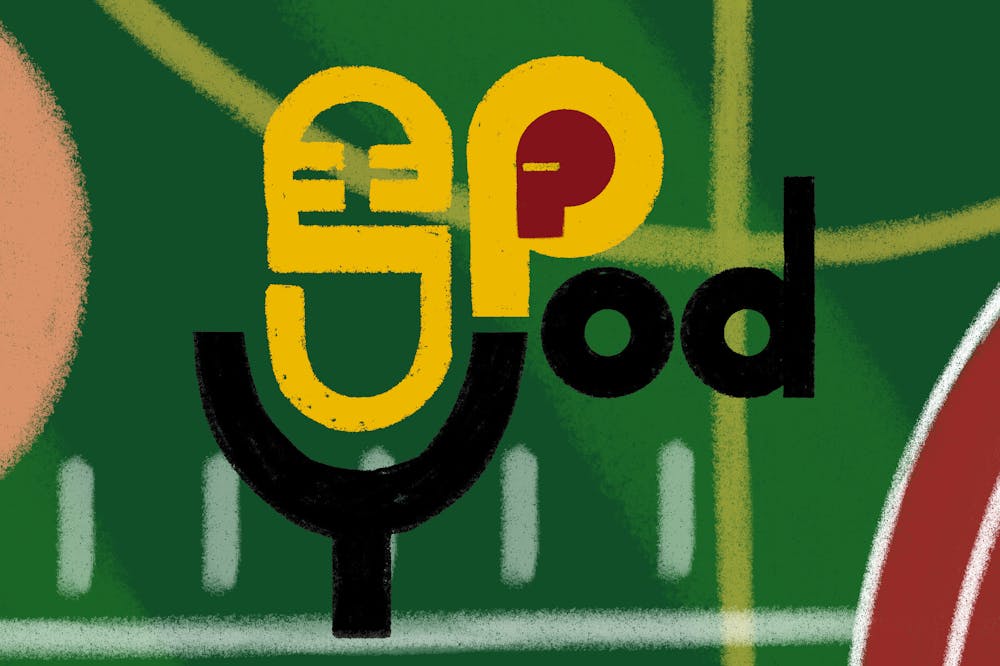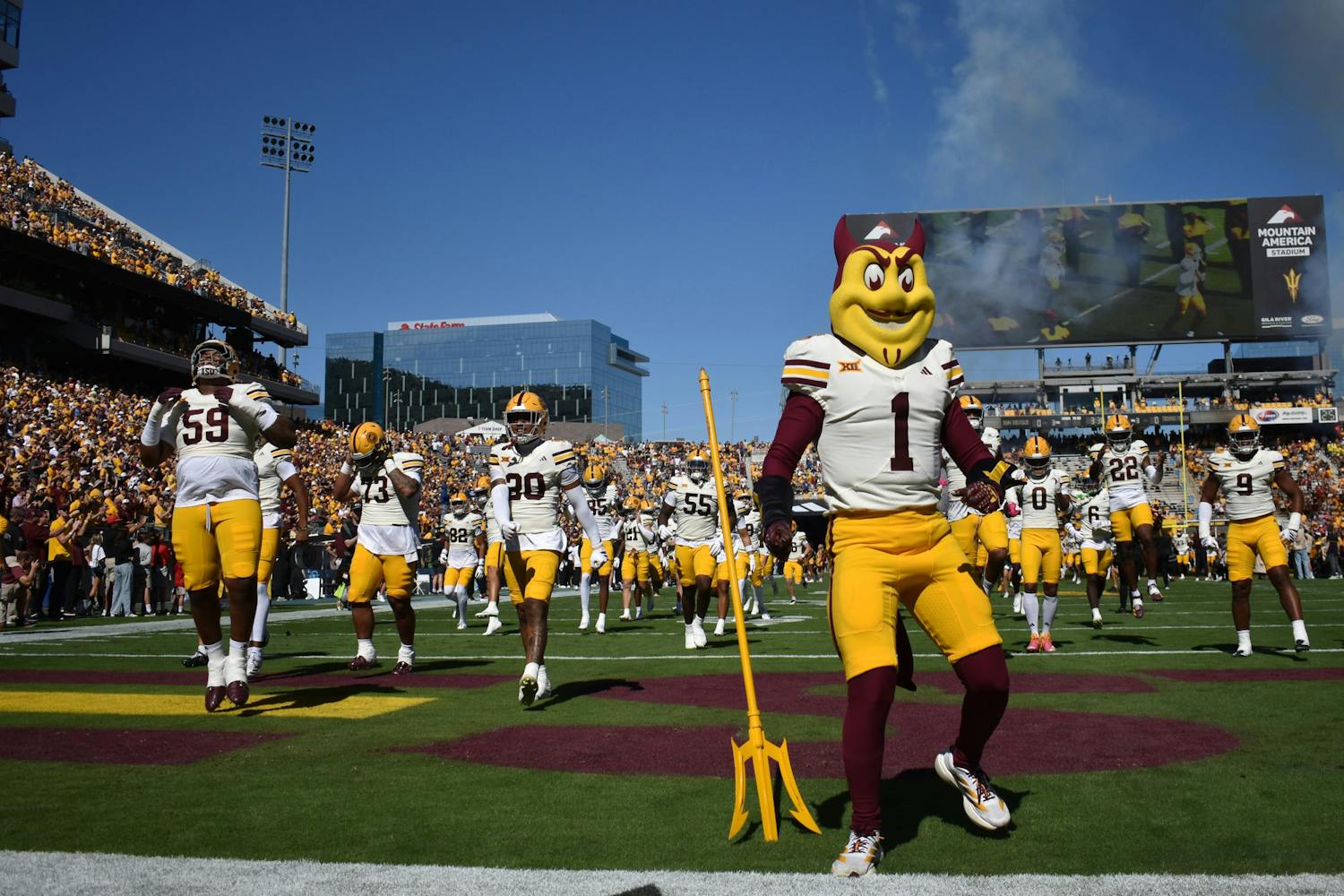SP Sports editors Koki Riley and Alex Coil chat with reporter Carson Breber to break down last Sunday's football game against USC.
ALEX COIL:
Hello everyone. Welcome back to SP Sports Weekly, your weekly roundup of State Press sports content. Alongside Koki Riley, I am Alex Coil and we're the sports editors at The State Press. On this episode, we welcome Carson Breber to talk about ASU’s recent loss to USC.
KOKI RILEY:
Thank you so much for joining us today, Carson.
CARSON BREBER:
Thanks for having me guys.
KOKI RILEY:
So, just to start things off. What happened to ASU on Saturday?
CARSON BREBER:
Well, I think that we saw about 57 minutes of really good football. I think that we saw a, probably compared to what people expected, over performance from the defensive line that was pretty consistently generating pressure and making life really hard on Kedon Slovis, who did not look comfortable whatsoever in that game. We saw obviously explosions from new offensive weapons in this offense and Rachaad White and DeaMonte Trayanum. And it just came down to obviously execution at the end and you hear coach Herm Edwards talk and he basically says that he doesn't feel like there was anything they really could have done differently.
They were in the positions to win the game and they didn't execute in the biggest moments. That starts with obviously letting up a miracle touchdown on fourth and 13, as the Trojans began their comeback, it extends into the onside kick, which they obviously didn't recover, goes into another fourth and long touchdown. It was sort of a nightmarish finished, but I think that there were a lot of good things to take away from the majority of the game.
ALEX COIL:
It seemed like the defensive line played much better than many people expected. They seemed like they were getting pressure consistently, until those last couple of drives when USC kind of picked up the pace and maybe the defensive line was a little bit tired. How would you analyze how the defensive line played compared to the expectations coming in and how much did the changing of the scheme from a 3-3-5 to the 4-3 help?
CARSON BREBER:
Well, I think that it definitely helps because you're talking about obviously bringing more guys consistently. And if there were two people on this line that you would have had a pretty high degree of confidence in, I would have said certainly Jermayne Lole, who was first team all Pac-12 preseason, and Tyler Johnson and those were two guys who really showed out and played at a really high level and generated that pressure consistently.
So, I think that we saw immediately there's still a great degree of depth in the backend of this defense. If it's DeAndre Pierce, a new addition, we saw Aashari Crosswell, wasn't always out there. That's a guy who has been a consistent producer for this defense. So, they're strong on all three levels. And I think that the 4-3-4 is obviously more conventional. It's more of an NFL pro style defense. And I think that it worked in a lot of ways in this game.
KOKI RILEY:
But, as well as ASU did play for 57 minutes, they still blew a two-score lead with about three minutes left to play in the game. What does ASU need to do to really close in and finish off teams?
CARSON BREBER:
Well, I think that it starts with, weirdly enough, the fluke onside kick play, because if they recover that, the game's basically over and Herm said that that was something that they practiced consistently. It seemed to me to be a pretty strange coverage. It's very rare that you see the onside kick actually get behind the recovery team, and it seemed like it got about 15 yards deep, which is pretty abnormal. And a lot of guys in the ASU frontline seemed more concerned with the USC guys coming downhill than actually swarming to the ball. So that was atypical, I would say. And that's obviously a problem in its own right.
But I think what was most troubling is almost out of their control, that in that moment, they gave the ball back to a guy, Kedon Slovis, who hadn't played his best football that day and hadn't been consistently comfortable and you gave him that sliver of an opportunity that he took full advantage of because he was pretty masterful in that final drive and threw an incredible last ball to Drake London, who made a contested catch on fourth and nine, and the defense was in position there. It was just good offense beating better defense.
So, I think we saw fatigue play a factor towards the end of that game, which obviously to me falls more on the offensive end, because if they had been more aggressive, if they had had some more sustained drives, we never saw the passing game get going for them. I think that they would have won this football game easily. So, it comes down to the onside kick and, to me, not as much the defense as the offense.
ALEX COIL:
Now let's get into that offense. You mentioned the passing game struggled. Jayden Daniels hit five different receivers, but none of them, except for Rachaad White, for really over 28 yards. Daniels was 11-for-23, 134 yards with one touchdown, didn't turn the ball over, but didn't do anything great either except for the one screen pass. What was the problem on the offensive side, especially with the receivers without Frank Darby, after the first quarter?
CARSON BREBER:
Well, we saw the USC defense coming downhill time and again and bringing pretty aggressive pressure and they really dominated the ASU offensive line, which wasn't necessarily a matchup you would have expected to favor them because this is a USC front where there was a lot of uncertainty and Clay Helton said after losing his best player in that unit, Jay Tufelle who opted out of the season, and another expected rotation guy in Jacob Lichtenstein, that a lot of those guys were going to be going into the situation for the first time and he was sort of just going to try to feel out that position group and they ended up playing really well. And so that obviously gave a tremendous deal of difficulty to ASU and to Jayden Daniels, who was able to take advantage with the run game, because you're sending a bunch of guys downhill.
That means that there's an opportunity somewhere else, but he never got comfortable there. And I think that USC came out with the right game plan, which is take away what ASU is most comfortable with, made them, beat them with unproven guys and Rachaad White and DeaMonte Trayanum who played fantastic, but of course, it just didn't quite hold up in that fourth quarter.
KOKI RILEY:
But if you're Herm Edwards and you're sitting there on Sunday morning and trying to get your takeaways from this game, what should they take away? What should be some of the more negative things? And some of the more positive things that this ASU team should take away from?
CARSON BREBER:
We have a really strong team defense that held an offense that was supposedly going to be one of the absolute best in the country that I think showed cracks of its own on the USC end, but still tremendous potential there, unbelievable weapons. They held those guys in check and they were able to force Kedon Slovis to make decisions he's not used to making by playing that zone. And so, it basically turned into USC throwing a bunch of screens and short passes to try to get their weapons in space. And what's incredible is ASU wasn't killed that way because when you have Amon-Ra St. Brown and Tyler Vaughns and Drake London and Bru McCoy, all getting the ball and it's one-on-one, that can be a scary situation, but they held up well there. So, I think that's a positive takeaway.
But I think, on the offensive venue of another positive takeaway, which is of course the incredible play of the running backs. But I think you need to look, where do we turn in the passing game when we're having pressure brought on us consistently and when Frank Darby isn't out there as sort of a safety valve? Because there wasn't that go-to experienced guy in this receiving core. And I don't think we need to overplay the inexperience of that group, but you are trotting out guys like LV Bunkley-Shelton, and Johnny Wilson who had a rough game who haven't been there before. Now, you're receiving core shouldn't be the defining factor in your offensive success, but it comes down to the line and it comes down to making Jayden comfortable and making the necessary adjustments to put them in a position to succeed and get guys open.
ALEX COIL:
Now I want to focus on a specific moment that I think was also big. In addition to the onside kick that you mentioned. Starting the fourth quarter, around the 12-minute mark or 13-minute mark, USC was in ASU territory. They were around like the 13-yard line, they went for it on the fourth and one when they could have kicked a field goal to go down seven instead of when they were down 10, they didn't get it. ASU got the stop. Now you're thinking, if you're ASU, we can get a score to go up three scores. Instead, drive stalls to get a field goal. How big was it? As you mentioned earlier, they couldn't finish off drives, especially that drive. How big was that in the, in the, in the result of the game?
CARSON BREBER:
That was huge. And I think that we saw that with, I can't remember if they had one or two more offensive drives after that, but in the fourth quarter they never got anything going. And I think that there was a certain degree of passivity, as far as the play calling, where they, especially on their last drive, were really just trying to run out the clock and run the ball down USC's throat and they failed. But I think that that was a huge moment because that's a dagger-in-the-heart opportunity. You put up another score there and USC is feeling pretty down on their luck. And even though the defense did hold after that and they still had that opportunity, and again, if they recovered the onside kick that game's probably still over. I think that that was definitely a turning point because whenever you give that team, that breath of air and that opportunity for more momentum, then you are doing a great disservice to yourself.
KOKI RILEY:
Hmm, that — I would certainly agree with that statement. And I think that's a good point to end this conversation. Thank you so much for joining us on the show, Carson, to break down this really wild ASU opening game.
CARSON BREBER:
Thanks for having me guys.
ALEX COIL:
Thank you all for listening to SP Sports Weekly. For more State Press content, visit statepress.com, like us on Facebook, or follow us on Twitter at @statepress and @statepresssport. See you all next week for the next episode of SP Sports Weekly.
Reach the reporters at ancoil@asu.edu and kbriley@asu.edu and follow @anc2018 and @KokiRiley on Twitter.
Like The State Press on Facebook and follow @statepress on Twitter.




